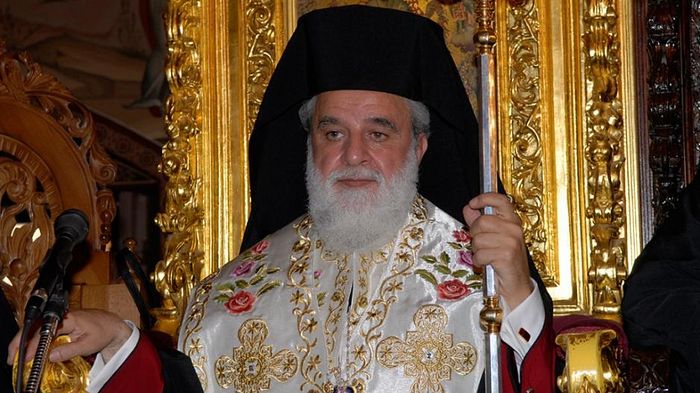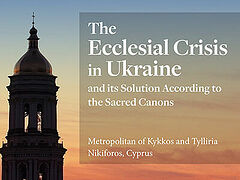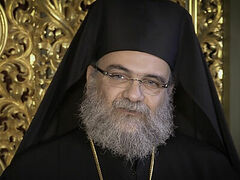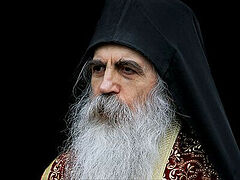On 16th September a joint presentation by the Metropolitan of Kykkos and Tillyria Nikiforos and the Metropolitan of Tamassos and Oreini Isaiah (the Greek Orthodox Church of Cyprus) was heard at the “World Orthodoxy: Primacy and Conciliarity in the Light of Orthodox Dogmatic Teaching” conference taking place in Moscow at the Christ the Saviour Cathedral. Before this, the metropolitan of Tamasossos and Oreini Isaiah greeted the conference participants with the following words: “Your Holiness, Your Graces, much-esteemed conference participants. I would like to thank you for inviting me and the elder Metropolitan of Kykkos and Tillyria Nikiforos to take part in this theological forum. Metropolitan Nikiforos and I decided to give a joint presentation based on Metropolitan NIkiforos’ recently published book on the topic of resolving the present-day Ukrainian problem on the basis of the holy canons. This book was recently translated into Russian. … You know that geopolitical events have compelled Cyprus to fall in line with Euro-American policy with all the attendant consequences. In spite of this, we are speaking out and writing, and we are also beseeching God to enlighten us to ‘rightly divide the word of truth’ as our episcopal conscience dictates, no matter what the negatives consequences may be for us.
I will no longer detain your attention and I offer you some thoughts by Metropolitan Nikiforos, hoping that the saints and martyrs of Orthodox Cyprus and Russia will intercede before our Lord Jesus Christ and the Most Holy Mother of God for the unity of the Orthodox Church and the speedy resolution of this grave ecclesiastical problem which should never have arisen.”
The presentation, the text of which is given below, was read out by archimandrite Seraphim (Gavrikov).
The Orthodox Catholic Church today finds herself in a state of crisis and division as a result of the Ukrainian ecclesiastical issue. This issue arose as a consequence of the autocratic and uncanonical granting by the Ecumenical Patriarch of Constantinople of “autocephaly” to the schismatic structures of the Ukrainian Church against the will of the Russian Orthodox Church, which is the Mother Church for the Orthodox ecclesiastical territory of Ukraine.
The fundamental problem which will occupy us in the course of our presentation is whether “autocephaly” was granted to Ukraine by right or by error.
But before embarking on a discussion on this topic, we feel it necessary to state straight away that we deeply revere and venerate the holy Ecumenical Patriarchate of Constantinople for its unique and unrepeatable contribution to the One, Holy, Catholic and Apostolic Church.
As the Primate of the First Throne of the Orthodox Catholic Church, each Ecumenical Patriarch had, has and will have the canonical right to:
1) be the honorary president among all the Orthodox autocephalous Churches as “first among equals” (primus inter pares);
2) coordinate the Orthodox Churches on critical issues affecting inter-Orthodox interests;
3) express and implement the decisions which were taken at the conclusion of a pan-Orthodox Assembly or Synaxis of Orthodox Primates;
4) grant autocephaly or autonomy with the condition of the assent and approval from the other Orthodox autocephalous Churches, and finally,
5) the Ecumenical Patriarch as the Primate of the First Throne of the Orthodox Church is the unchanging guardian and guarantor of both canonical order and the successful functioning of the conciliar and democratic order (systema) of Orthodoxy.
Any false interpretation, any attempt to re-evaluate the privileges of the honour of the Ecumenical Patriarchate as a “primacy of authority” distorts Orthodox ecclesiology, destroys its conciliar and democratic order and introduces an autocratic approach in the spirit of papism, while the Ecumenical Patriarch is turned into an Eastern pope who will ex cathedra expound the position of the Orthodox Church without taking into account the opinions of the other Orthodox primates. In this instance, not a single bishop of the Orthodox Church can remain coldly indifference. It is his duty to transform his passive alarm into responsible action, rise above himself, and, guided by his episcopal conscience, selflessly and fearlessly embark on the struggle against all arbitrariness in as far as this arbitrariness is aimed against the conciliarity of the Orthodox Church and poses the threat of division within Universal Orthodoxy.
There can be no doubt that the unilateral decision by Ecumenical Patriarch Bartholomew to grant the status of “autocephalous Church” to an unrepentant schismatic structure of defrocked, anathematized and never ordained pseudo-clerics, while simultaneously ignoring the canonical Ukrainian Church under metropolitan Onuphrius, creates a most complex ecclesiastical problem which threatens pan-Orthodox unity with a schism of monstrous proportions.
Thus, for more than 330 years all the Orthodox autocephalous Churches without any objections or qualifications have recognized the Ukrainian Church to be in the ecclesiastical jurisdiction of the Patriarchate of Moscow, and not the Ecumenical Patriarchate.
Moreover, the Ecumenical Patriarch Bartholomew himself stated in his address to the Ukrainian people on 26th July 2008 the commonly-held ecclesiastical conviction that the Ukraine had been handed over by the Ecumenical Patriarchate and since then has been under the Russian Church.
What is more, in two of his letters of reply to the Patriarch of Moscow, Patriarch Bartholomew recognized both the defrocking (1992) and anathema (1997) which the Moscow Patriarchate imposed upon the former metropolitan of Kiev Philaret. That is, he recognizes that the Moscow Patriarchate enjoys both the fundamental rights of ecclesiastical submission – the right to ordain bishops and the right to judge bishops. Both of these fundamental rights of ecclesiastical submission are recognized also by the archbishop of Athens and all Greece, who later changed his position to fall in line with that of the Ecumenical Patriarchate.
It would appear that the most convincing reply to the question as to who has the right to grant autocephaly to a Local Church and on what conditions is given by Patriarch Bartholomew himself. As he asserted in an interview with the Greek newspaper Nea Ellada in January of 2001, “autocephaly and autonomy are granted by the whole Church by decision of an Ecumenical Council. As we cannot call an Ecumenical Council for various reasons, then it is the Ecumenical Patriarchate as the coordinator of all the Orthodox Churches which grants autocephaly or autonomy on the condition that they will approve it.”
The Ecumenical Patriarchate of Constantinople, according to the divine and holy canons (the 3rd canon of the Second Ecumenical Council and the 28th canon of the Fourth Ecumenical Council), enjoys the “primacy of honour” among the Patriarchal Thrones of the East. After the Great Schism of 1054, the Ecumenical Patriarchate became the first Throne in the One, Holy, Catholic and Apostolic Orthodox Church of Christ and enjoys the canonical right to preside in honour among the Local autocephalous Orthodox Churches. In a more special sense, the Ecumenical Patriarch of Constantinople as the “first among equals” (primus inter pares) has the right to preside at an Ecumenical Council and, correspondingly, is obliged to coordinate the Orthodox Churches. He is also empowered to grant autocephaly or autonomy to a particular ecclesiastical territory in certain, clear and strict conditions established by Church Tradition and in accordance with Orthodox ecclesiology and canonical order. And these conditions are identical to those upon agreement was reached by representatives of all the Local Orthodox Churches at the sessions of the inter-Orthodox preparatory commission in 1993 and 2009 which laid the groundwork for the Holy and Great Council of Crete in 2016.
Unfortunately, the text of this joint decision was never presented to the Holy and Crete Council in Kolimvary in Crete. Some people claim that this is because the Russian Church did not agree with it. But the Holy Synod of the Russian Church officially stated on 17th October 2019 that “in reality the topic of autocephaly was removed from the agenda of the Council … at the insistence of Patriarch Bartholomew.”
Thus, the very first thing that a Church which wishes to be granted autocephaly should do is to express on behalf of its pleroma which bears the names of Christ (the clergy and the people) the desire to be granted autocephaly by petitioning the Ecumenical Patriarchate and hoping the petition will be examined.
In particular, concerning the issue of Ukraine which we are discussing at present, we should note the following. The Ecumenical Patriarch could receive for study a petition for autocephaly only from a single ecclesiastical structure in the country, and even then, only if it fits the canonical requirements. As we all know, the sole canonical ecclesiastical structure in Ukraine is that headed by metropolitan Onuphrius and recognized by all the Orthodox Churches (and until recently by the Ecumenical Patriarchate), which is the Ukrainian Orthodox Church of the Moscow Patriarchate, consisting of ninety bishops, 12 500 parishes, 250 monasteries, 5 000 monks and nuns and tens of millions of the faithful who make up the overwhelming majority of the Orthodox people of Ukraine.
But this canonical autonomous Church, which since 1686 has submitted to the ecclesiastical jurisdiction of the Moscow Patriarchate, while enjoying the right to do so, has never petitioned for autocephaly. And has never received autocephaly from anyone.
It was two schismatic structures which fought for, begged for and eventually received autocephaly for the Ukrainian Orthodox Church.
If we are to be honest, then it is impossible to understand in what manner Patriarch Bartholomew – in spite of what he proclaimed until quite recently before the issue arose – now unilaterally, without the preliminary consent and affirmation of the other Orthodox autocephalous Churches (including the Mother Church of Russia, from which the Ukrainian Church was supposed to have broken away) can grant autocephaly; and even then not to the Ukrainian Church with metropolitan Onuphrius as her head, but to two schismatic groupings, that is, the defrocked Philaret and the never ordained Macarius who does not have apostolic continuity.
As we may have expected, the disdain for the sacred institution of autocephaly which occurred in Ukraine has not only not led to the desired church reconciliation and unity, but, on the contrary, has brought even greater confusion and division in the life of the Ukrainian people which has endured such harsh tribulations, and has also provoked a profound crisis in both the Ukrainian Orthodox Church and in Universal Orthodox.
And so:
1) The granting of autocephaly was requested not by the universally recognized Ukrainian Orthodox Church whose primate is metropolitan Onuphrius, but by two significantly smaller schismatic groupings;
2) The role of the Mother Church, which for the Ukraine is the Russian Church, was completely ignored and not taken into account;
3) Patriarch Bartholomew set about granting autocephaly without contacting or entering into negotiations with the primates of the other Orthodox autocephalous Churches.
One further problem which we have to be clear about is the break in eucharistic communion between two Local Orthodox Churches.
Some people accuse the Orthodox Moscow Patriarchate of hurriedly, artificially and, from the ecclesiological perspective, unjustifiably breaking off eucharistic communion with the Ecumenical Patriarchate of Constantinople, and later with the Churches of Greece and Alexandria which joined Constantinople, or at least with those bishops who consented to concelebrating with clerics from the schismatic communities of the Ukrainian Church.
Those who accuse the Moscow Patriarchate do not recall or do not try to recall that the first teacher for it in this affair was in the Ecumenical Patriarch. We shall never forget the pompous parade at the Phanar, broadcast live to the whole world, attended by not only the Ecumenical Patriarch, but by the great multitude of metropolitans of the Ecumenical Throne and at which the archbishop of Athens Christodoulos of blessed memory was punished by having communion broken off with him. And for one reason only: the ever-memorable archbishop had dared to call a Council of the Church of Greece at which, without the Patriarch’s confirmation, there were elected three new metropolitans to the dioceses of the so-called “new lands”. The Moscow Patriarchate broke off eucharistic communion with the Ecumenical Patriarchate because the latter had violated the holy canons, that is, as we have demonstrated above, he had unilaterally interfered in the affairs of the Ukrainian Church, which is not part of its canonical territory, and the icing on the cake of this violation was the uncanonical granting of the Tomos of autocephaly to the schismatic structure of Ukraine.
Therefore, the decision by the Moscow Patriarchate to break off eucharistic communion with the three Churches of Constantinople, Alexandria and Greece was correct and justified, for it was based on the holy canons and is consonant with the centuries-old practice of the Church.
What is most alarming of all in the events surrounding the Ukrainian church issue is the growing conviction that it will become an ecclesiological problem on a greater scale. The ambitions of the Ecumenical Patriarch today extend over the entirety of Ukraine: in essence, he is laying claim to the right to intervene in the internal life of all the Local Orthodox Patriarchates and autocephalous Churches. Unfortunately, the newly-appeared theory that the Primate of Constantinople is the head of all the Churches receives support and is aggravated by those closest to the Ecumenical Throne.
At the same time, from the perspective of history and the holy canons on the question of primacy in the Catholic Church there can be only one reply that can be subject to doubt. Throughout her two-thousand-year history the Orthodox Church has never endowed any of her bishops with the title and powers of Head of the Church.
Therefore, it is blindingly obvious – and this can be reasoned historically, canonically and dogmatically from the iconographic tradition and the writings of the fathers – that not a single one of the primates, patriarchs or heads of the autocephalous Churches can occupy the place of the one unchanging Head of the Church, which is our Lord Jesus Christ. The Church in her conciliarity and in her catholicity has no other Head than our Lord Jesus Christ. The supreme canonical authority in the Church is the Ecumenical Councils and not any of the primates of the Local Orthodox Churches. From antiquity onwards people in the Church have believed in the Ecumenical Council as the infallible and supreme institution of the Church and have interpreted it ecclesiologically in this manner.
The ancient and undivided Church, which had a very profound understanding of herself as the sacramental Body of Christ, that is, as the one, undivided, divine and human, visible and invisible organism with our Lord Jesus Christ as her sole Head, asserted her manner of governance on this fundamental principle. It is in this way that the ancient Church found her form of order (politeuma) not in a monarchical, absolutist system, but in a conciliar and collegial system, which is the Ecumenical Council.
It was in this way that the primarily spiritual and otherworldly nature of the Church came to the fore and that there was preserved the vital belief of the faithful that the true and indeed sole pilot of the Church is the Lord himself, while the hierarchy is merely the organ through which the governance of the Church is realized authoritatively.
In conclusion we note the following. At the earliest stage of the period of the one and undivided Church the institution of the papacy as the supreme authority in the Universal Church and the source of all authority was unknown. Before the Great Schism it was the Ecumenical Council which was the highest collegial organ within the one and undivided Church. This conciliar system of governance was continued in the Orthodox Catholic Church. Thus, the political and administrative order of the Orthodox Catholic Church and all the individual Orthodox autocephalous Churches is at present both conciliar and hierarchical. This characteristic element of the political and administrative order of the Orthodox Church finds its complete justification and foundation in Scripture; they are institutionalized and legalized by the divine and holy canons and the practice of the Church. We should flee all attempts to overthrow this conciliar and hierarchical system which we have inherited from the apostles. The organization of the Orthodox Church is based on the foundation of conciliarity and not on an absolute, monarchical and centralized primacy. If we desire unity and peace in the Church both at the local and universal level, we have to preserve the conciliar and hierarchical system of governance of the Orthodox Catholic Church.





